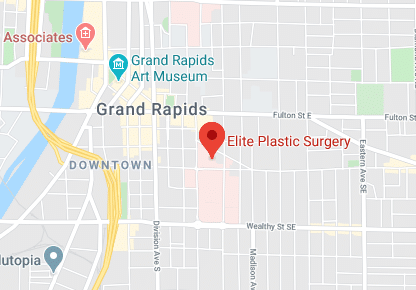
At Elite Plastic Surgery, our surgical team removes skin cancer growths and does its magic with reconstruction afterwards. But we’d like to not see so many skin cancer patients. Let’s see what you know about that closest star up in the sky and what it does to your skin.
Acronyms anyone?
Sunscreen is full of acronyms: SPF, UVB, UVA. What do they all mean? OK, SPF is sun protection factor. An SPF of 15 means simply that with sunscreen on you can be out in the sun 15 times longer before getting burned than you would without it. UVA and UVB sound like pretty much the same thing, but they are quite different types of ultraviolet rays from the sun. Some labels say the sunscreen blocks UVB rays. Others say they are broad based. You need a sunscreen that blocks both UVA and UVB rays. Why? They both are beating up your skin. UVA rays penetrate the epidermis and affect the dermis beneath, causing your skin to age and creating the beginnings of skin cancer. UVB rays cause sunburn on the epidermis and also lead to the topical skin cancer lesions. Early sunscreens only worked on UVB rays because of their obvious sunburn link, but recent research points to UVA rays as potentially being more dangerous because they are involved in melanoma formation.
Skin cancer is the most common form of cancer
This is true. In the U.S. over one million people each year are diagnosed with skin cancer. Probably double that or more have skin cancer but have not been diagnosed. That’s the problem. If a person blithely goes through life with progressing melanoma, but doesn’t get checked, the odds are that person won’t be going through life for long, especially if it metastasizes.
If you get skin cancer you die
This is not even remotely true. Most skin cancers, if detected early enough, are all treatable with surgery. Squamous cell carcinomas and basil cell carcinomas are far less concerning than melanoma, but all skin cancers are treatable, if caught early. Even if they’re not life threatening, though, skin cancer can be disfiguring.
Sunscreen prevents skin cancer
Nope. Sunscreen helps block the rays that lead to skin cancer, but just because you have on sunscreen doesn’t mean you can spend every waking minute in the sun without repercussions. Sun damage is cumulative. If you’ve ever received a serious sunburn, like we all did as children, then that damage comes due as an older adult. It’s estimated that every time you had a peeling, blistering sunburn as a kid (remember being at Sleeping Bear Dunes, getting fried, and wearing a T-shirt in the water the next day?) those double your chance of developing melanoma later in life.
If you have lots of moles, you have a higher risk of melanoma
This is true. People with moles, especially large ones, have a higher risk of melanoma. Those moles need to be checked constantly to see if they change shape or color.
Now you’re a sun exposure expert. At Elite Plastic Surgery, we have the expert surgical team that can remove skin cancers and repair the area afterwards. Plus, we offer various procedures and treatments that address the damage done by Mr. Sun on your skin. Call us at (616) 459-1907 to make your appointment.


No comments yet.